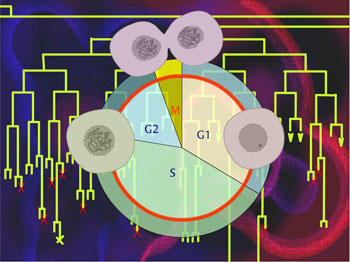Concept 38 Development balances cell growth and death.

In a biological sense, growth results from the reproduction of new cells from pre-existing ones, by the process of cell division (mitosis). Once a tissue or organ reaches an appropriate size, mitosis slows and cells enter a resting phase. This cell cycle of growth and rest is controlled by "checkpoint" molecules first characterized in the 1980s and 1990s in yeast, and then in other eukaryotes.
Remarkably, normal development requires that some healthy cells be eliminated, killed, by a process called "apoptosis." Initial clues about the nature of apoptosis came from detailed studies of the roundworm Caenorhabditis elegans, in which development of each of the 959 cells in the adult can be traced from the fertilized egg. Analysis of cell "fates" showed that specific cells are programmed to die at specific times during embryonic development. Disruptions in the program lead to an overabundance of cells — a hallmark of cancer.
 DNA is packaged in a chromosome.
DNA is packaged in a chromosome. Higher cells incorporate an ancient chromosome.
Higher cells incorporate an ancient chromosome. Some DNA does not encode protein.
Some DNA does not encode protein. Some DNA can jump.
Some DNA can jump. Genes can be turned on and off.
Genes can be turned on and off. Genes can be moved between species.
Genes can be moved between species. DNA responds to signals from outside the cell.
DNA responds to signals from outside the cell. Different genes are active in different kinds of cells.
Different genes are active in different kinds of cells. Master genes control basic body plans.
Master genes control basic body plans. Development balances cell growth and death.
Development balances cell growth and death. A genome is an entire set of genes.
A genome is an entire set of genes. Living things share common genes.
Living things share common genes. DNA is only the beginning for understanding the human genome.
DNA is only the beginning for understanding the human genome.